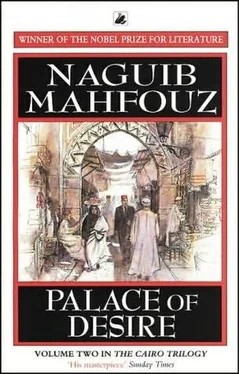Naguib Mahfouz - Palace of Desire
Здесь есть возможность читать онлайн «Naguib Mahfouz - Palace of Desire» весь текст электронной книги совершенно бесплатно (целиком полную версию без сокращений). В некоторых случаях можно слушать аудио, скачать через торрент в формате fb2 и присутствует краткое содержание. Жанр: Современная проза, на английском языке. Описание произведения, (предисловие) а так же отзывы посетителей доступны на портале библиотеки ЛибКат.
- Название:Palace of Desire
- Автор:
- Жанр:
- Год:неизвестен
- ISBN:нет данных
- Рейтинг книги:5 / 5. Голосов: 1
-
Избранное:Добавить в избранное
- Отзывы:
-
Ваша оценка:
- 100
- 1
- 2
- 3
- 4
- 5
Palace of Desire: краткое содержание, описание и аннотация
Предлагаем к чтению аннотацию, описание, краткое содержание или предисловие (зависит от того, что написал сам автор книги «Palace of Desire»). Если вы не нашли необходимую информацию о книге — напишите в комментариях, мы постараемся отыскать её.
, his rebellious children struggle to move beyond his domination, as the world around them opens to the currents of modernity and political and domestic turmoil brought by the 1920s.
Palace of Desire — читать онлайн бесплатно полную книгу (весь текст) целиком
Ниже представлен текст книги, разбитый по страницам. Система сохранения места последней прочитанной страницы, позволяет с удобством читать онлайн бесплатно книгу «Palace of Desire», без необходимости каждый раз заново искать на чём Вы остановились. Поставьте закладку, и сможете в любой момент перейти на страницу, на которой закончили чтение.
Интервал:
Закладка:
She cast him a glance that made him feel she welcomed this chance to talk and replied, "Because she's a traitor with no respect for promises. She betrayed me more than a year ago. She left my house without asking permission and disappeared."
Was it possible she really did not know where Zanuba had been during that time? Since he did not care to offer the least comment on her words, she finally asked him, "Didn't you hear about that?"
"I did eventually."
"I've taken care of her since she was a child and have looked after her as though I were her mother. See how I've been rewarded! To hell with her genes!"
Pretending to object, Ali Abd al-Rahim teased her, "Don't insult her family. You're part of it."
But Zubayda replied seriously, "She doesn't have any of my genes."
Al-Sayyid Ahmad inquired, "Who do you suppose her father was?"
"Her father!" This comment emerged from Ibrahim al-Far in a tone that suggested a string of sarcastic remarks was to follow, but Muhammad Iffat headed him off by interjecting, "Remember you're talking about Yasin's wife."
The mirthful look left al-Far's face, and he retreated into an uneasy silence. Then Zubayda spoke up again: "I'm not joking about her. She envied me for a long time. Even when she was in my custody she wanted to rival me. I spoiled her and pretended not to see her defects". Then she laughed and continued: "She wanted to be a soloist, a vocalist". Looking around at her friends, she observed sarcastically, "But she failed and got married."
Ali Abd al-Rahim asked incredulously, "In your opinion, does marriage constitute failure?"
She squinted an eye at him and raised the eyebrow of the other one and then answered, "Yes, fellow. A performer never leaves her troupe unless she's a failure."
Then Jalila sang, "You're the wine, my love. You've cheered us up."
Al-Sayyid Ahmad grinned broadly and greeted the song with a gentle sigh that revealed his delight. But Ali Abd al-Rahim rose once more, saying, "A moment of silence until we finish off this round". He filled the glasses again, redistributed them, and returned to his seat with his own drink.
Grasping his glass, al-Sayyid Ahmad glanced at Zubayda, who turned toward him and smilingly raised her drink as if to say, "To your health". He imitated her and they both drank at the same time. She was gazing at him with a merry look. A year had passed since he had felt like looking for a woman. The harsh experience he had endured seemed to have deadened his enthusiasm, but pride or ill health could also have been responsible. Even so, the combined influence of alcoholic intoxication and this affectionate look stirred his heart. He savored the sweetness of this welcome, which followed a bitter rejection. He considered this a friendly greeting from the entire sex he had been so fond of all his life. It bound up his wounded dignity, which had fallen victim to betrayal and age. Zubayda's eloquent smile seemed to say, "Your day's not finished yet". He kept looking and smiling at her.
Muhammad Iffat brought the lute and placed it between the two women. Jalila picked it up and began to play. Once she was confident of their attention, she sang, "Beloved, I promise you…"
As usual when he heard Jalila or Zubayda sing, Ahmad Abd al-Jawad pretended to be moved by the music. He nodded his head appreciatively, as if wishing to induce ecstasy by acting it out. The truth was that all he had left from the world of song was a set of memories. The great performershe had admired, like al-Hamuli, Uthman, al-Manilawi, and Abd al-Hayy, had passed away — just as his youthful era of conquests had vanished. He would have to accusto tn himself to taking pleasure in what was at hand and in triggering a feeling of ecstasy by going through the motions. His love of song and infatuation with music had led him to visit the theater of Munira al-Mahdiya, but he had not liked the combination of theater and music. Besides, he chafed at sitting in a theater like a school auditorium. At Muhammad Iffat's house he had also listened to records of the new singer Umm Kalthoum but only with a cautious and suspicious ear. He did not enjoy her singing., even though it was said that Sa'd Zaghlul had praised the beauty of her voice.
Yet his appearance gave no hint of his feelings as he gazed at Jalila with happy delight and sang the words of the refrain, "I hold you responsible," with the others in his pleasing voice.
Then al-Far cried out with regret, "Where, oh where is the tambourine? Where is it so we can hear the son of Abd al-Jawad?"
"Ask rather: Where's the Ahmad Abd al-Jawad who used to play the tambourine?" he said to himself. "Oh… why has time changed us?"
Jalila ended her song in an atmosphere of receptive approval. But with a grateful smile she said apologetically, "I'm tired."
Zubayda heaped her with praise. The two performers frequently complimented each other either from politeness or from a desire to keep the peace. Everyone realized that as a performer Jalila's star was rapidly setting. One of the most recent indications of that was the desertion of her tambourine player, Fino, to another troupe. This eclipse was only natural, given the withering away of all the qualities on which her past glory had rested: her charm, beauty, and voice. For that reason, Zubayda no longer felt particularly envious of her and was capable of flattering her former rival good-humoredly, especially since Zubayda had reached the pinnacle of her career, one that could only be followed by a decline.
The friends often wondered whether Jalila had prepared properly for this dangerous stage of her life. It was Ahmad Abd al-Jawad's opinion that she had not. He accused some of her lovers of squandering much of her fortune but at the same time proclaimed that she was a woman who knew how to get money one way or another. Ali Abd al-Rahim supported him, saying, "She profits from the beauty of the women in her troupe, and ever so gradually her home's turning into a different kind of house."
Their consensus was less sanguine about Zubayda's future, for despite the freedom with which she helped herself to her lovers' wealth, she spent liberally and was fond of the showy possessions that dissipate money quickly. Moreover, she was addicted to alcohol and narcotics, cocaine in particular.
Muhammad Iffat told Zubayda, "Allow me to express my admiration for the sweet looks you are directing to one of us."
Jalila laughed and said softly, "His infatuation's revealed by his eyes…."
Ibrahim al-Far asked with sham disapproval, "Do you think you're in a charitable institution for the blind?"
With feigned regret Ahmad Abd al-Jawad replied, "If you continue to speak so bluntly, you'll never fulfill your ambition to be pimps."
Zubayda told Muhammad Iffat, "The only reason I'm looking at him, God forgive rne, is out of envy at his youth. Look at his black head of hair among your white ones and tell me if you'd think he's a day over forty?"
"I'd give him about a century more."
Ahmad Abd al-Jawad retorted, "From your surplus years."
Jalila sang the opening of the song "The envious eye has a log in it, sweetheart."
Zubayda commented, "He doesn't need to fear my envy, for my eye would never harm him."
Shaking his head suggestively, Muhammad Iffat replied, "Your eyes are the cause of all the trouble."
Ahmad Abd al-Jawad told Zubayda, "Why are you talking about my youth? Haven't you heard what the doctor said?"
As though she could not believe it, she said, "Muhammad Iffat told me, but what's this pressure you're supposed to have?"
"He wrapped a strange sack around my arm and began to pump it up. Then he told me, 'You've got pressure.'"
"Where did this pressure come from?"
Al-Sayyid Ahmad laughingly answered, "I imagine that pump induced it."
Читать дальшеИнтервал:
Закладка:
Похожие книги на «Palace of Desire»
Представляем Вашему вниманию похожие книги на «Palace of Desire» списком для выбора. Мы отобрали схожую по названию и смыслу литературу в надежде предоставить читателям больше вариантов отыскать новые, интересные, ещё непрочитанные произведения.
Обсуждение, отзывы о книге «Palace of Desire» и просто собственные мнения читателей. Оставьте ваши комментарии, напишите, что Вы думаете о произведении, его смысле или главных героях. Укажите что конкретно понравилось, а что нет, и почему Вы так считаете.












